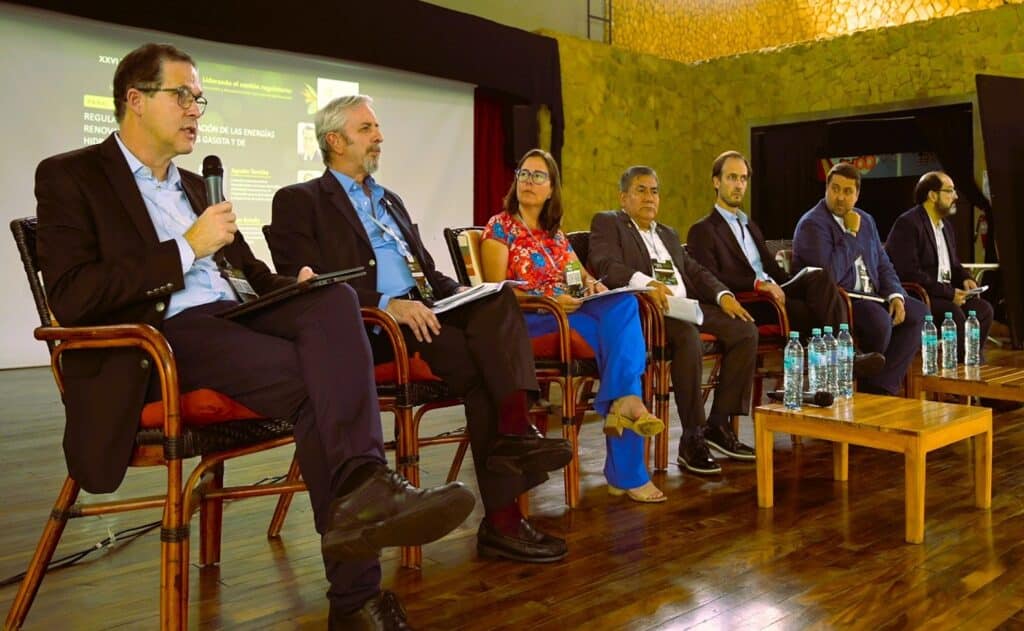
Discussion on regulating the integration of renewable energy into the gas and liquid hydrocarbon sectors, featuring the following panelists: Augusto Bonzi (IDB); Carlos Casares (ENARGAS, Argentina); Natalie McCoy (ERSE, Portugal); Omar Chambergo (OSINERGMIN, Peru); Agustín Torroba (IICA-CPBIO); Joan Batalla (SEDIGAS, Spain); and Andrés Cardozo (URSEA, Uruguay).
San Jose, Costa Rica, 30 May 2025 (IICA) – The annual meeting of the Ibero-American Association of Energy Regulators (ARIAE), held in San Jose and Guanacaste, Costa Rica, featured the II Entrepreneurial Forum, attracting 200 participants, including the Costa Rican Minister of Environment and Energy, the Executive Secretary of the Latin American Energy Organization (OLADE) and authorities of the Ibero-American General Secretariat (SEGIB); the XV Regular Annual Meeting of the ARIAE General Assembly, which was attended by 17 regulatory agencies of ARIAE; and the XXVI Annual Meeting of ARIAE Energy Regulators.
Over the course of three working days, the discussions addressed the latest developments in emerging technologies in the electric, gas and liquid hydrocarbon sectors, to explore their potential benefits for decarbonization. Participants shared experiences and best practices in regulating the energy transition, universal access to energy, cybersecurity, supply security and flexibility and the introduction of renewable energy in the gas and liquid hydrocarbon sectors.

José María Gonzalez (APPA); Blanca Perea (Naturgy Energy Group); and Natalie McCoy (ARIAE), during the panel discussion on “Decarbonization Technologies in the Gas and Petroleum Products Sector”.
Biofuels as a technological alternative for decarbonization
Natalie McCoy, a representative of ARIAE, in moderating the panel discussion on “Decarbonization Technologies in the Gas and Petroleum Products Sector”, on behalf of ARIAE, noted that many but not all sectors can be decarbonized. As such, we need to move forward with sustainable alternatives.
Agustín Torroba, an international biofuels expert at the Inter-American Institute for Cooperation on Agriculture (IICA) and the Executive Secretary of the Pan-American Liquid Biofuels Coalition (CPBIO), explained that biofuels provide an immediate alternative to decarbonize the transport sector amidst the current internal combustion paradigm.
Torroba stressed that, “Biofuels are an improvement on what we currently have and have been given a boost by the notion of energy security. Likewise, they also foster rural development in various Latin American regions, while generating an 80% reduction in the carbon footprint, thereby helping to tackle climate change and increase the quality of the air that we breathe”.
Torroba referred to the rapid rise of sustainable aviation fuels (SAFs), given that it is very difficult to electrify this sector or to change its matrix to green hydrogen. For this reason, 65% of the reduction in greenhouse gases (GHGs) in the sector by 2040 will be attributable to SAFs, and the maritime sector will be similarly impacted.
Joan Batalla, President of the Spanish Gas Association (SEDIGAS) described renewable gases as the path towards resilient decarbonization, above all, as it relates to biomethane and green hydrogen.
On the other hand, José María González, Director General of the Renewable Energy Association (APPA)—a grouping of entities in Spain’s renewable energy sector—underscored the need to decarbonize the automotive sector to increase energy efficiency through electrification. However, given the physical and economic limitations to electrification, biogas appears to be an alternative to other energy vectors, such as hydrogen.
Blanca Perea, Global Director of Regulation and Network Integration at the Spanish entity, Naturgy Energy Group, made the point that the current level of global circularity is just 7%, thus contributing to environmental problems.
Perea explained that “Biomethane has the same molecular structure as natural gas, which means it can be utilized in the existing infrastructure—from manufacturing to transportation and distribution networks”.
XXVI Annual Meeting of ARIAE Energy Regulators
Five regulators and guests from international institutions participated in the annual ARIAE meeting. Participants in the sessions shared experiences and best practices in energy transition regulations, universal access to energy, cybersecurity, energy supply security and flexibility, and the introduction of renewable energy in the gas and hydrocarbon sectors.
Torroba, representing IICA and the CPBIO, emphasized that 40% of GHG emissions in Latin America are generated by the transport sector, and the market share of electrical vehicles is just 1%. Thus, in 2050, the land transportation fleet will still be mainly powered by internal combustion engines.
He argued that, “There will be several energy transitions in each region, depending on the economic conditions. In our case, the biomass produced in our region has a very low carbon footprint thanks to the efficiency of the agriculture sector. Decarbonization involves a combination of technological solutions, and each country will gradually adapt, based on its available resources.

Natalie McCoy (ARIAE); Joan Batalla (SEDIGAS, Spain); and Agustín Torroba (IICA-CPBIO), during the panel discussion on Decarbonization Technologies in the Gas and Petroleum Products Sector.
More information:
Institutional Communication Division.
comunicacion.institucional@iica.int











